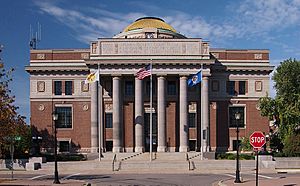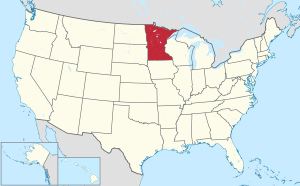Stearns County, Minnesota facts for kids
Quick facts for kids
Stearns County
|
|
|---|---|

|
|

Location within the U.S. state of Minnesota
|
|
 Minnesota's location within the U.S. |
|
| Country | |
| State | |
| Founded | February 20, 1855 |
| Named for | Charles Thomas Stearns |
| Seat | St. Cloud |
| Largest city | St. Cloud |
| Area | |
| • Total | 1,390 sq mi (3,600 km2) |
| • Land | 1,343 sq mi (3,480 km2) |
| • Water | 47 sq mi (120 km2) 3.4%% |
| Population
(2020)
|
|
| • Total | 158,292 |
| • Estimate
(2023)
|
160,977 |
| • Density | 113.9/sq mi (43.97/km2) |
| Time zone | UTC−6 (Central) |
| • Summer (DST) | UTC−5 (CDT) |
| Congressional districts | 6th, 7th |
Stearns County is a county in the U.S. state of Minnesota. As of the 2020 census, the population was 158,292. Its county seat and largest city is St. Cloud.
Included within the Minnesota Territory since 1849, the county was founded by European Americans in 1855. It was originally named for Isaac Ingalls Stevens, then renamed for Charles Thomas Stearns. Stearns County is part of the St. Cloud Metropolitan Statistical Area, which is also included in the Minneapolis-St. Paul Combined Statistical Area.
Contents
History
The Stearns County area was formerly occupied by numerous indigenous tribes, such as the Sioux (Dakota), Chippewa (Ojibwe) and Winnebago (Ho-chunk). The first large immigration was of German Catholics in the 1850s. Early arrivals also came from eastern states. The Wisconsin Territory was established by the federal government effective July 3, 1836, and existed until its eastern portion was granted statehood (as Wisconsin) in 1848.
The federal government set up the Minnesota Territory effective March 3, 1849. The newly organized territorial legislature created nine counties across the territory in October of that year. The original counties had portions partitioned off in 1851 to create Cass County and in 1853 to create Sibley, Pierce, and Nicollet counties. In 1855 parts of those counties were partitioned off to create Stearns County. It was to be named Stevens County for territorial governor Isaac Ingalls Stevens, who had conducted an expedition through the area in 1853, but due to a clerical error, the county was named Stearns for Charles Thomas Stearns, a member of the Territorial Council. (To compensate for this error the area two counties west was later named Stevens County.)
The February 20, 1855, act that created the county directed the naming of three county commissioners and specified St. Cloud as the county seat.
Writing in 1997, Jewish-American historian of America's religious architecture Marilyn J. Chiat commented, "Father Francis X. Pierz, a missionary to Indians in central Minnesota, published a series of articles in 1851 in German Catholic newspapers advocating Catholic settlement in central Minnesota. Large numbers of immigrants, mainly German, but also Slovenian and Polish, responded. Over 20 parishes where formed in what is now Stearns County, each centered on a church-oriented hamlet. As the farmers prospered, the small frame churches were replaced by more substantial buildings of brick or stone such as St. Mary, Help of Christians, a Gothic Revival stone structure built in 1873. Stearns County retains in its German character and is still home to one of the largest rural Catholic populations in Anglo-America."
Furthermore, according to Kathleen Neils Conzen, "Stearns County Germans early established daughter settlements at West Union in Todd County, Millerville in Douglas County, and Pierz in Morrison County, later flooded into North Dakota (where 'Stearns County German' remains a recognized ethnicity today), and in 1905 negotiated with the Canadian authorities to establish the St. Peter Colony in north-central Saskatchewan."
The first courthouse was put into service on July 12, 1864, and it remained in use until the present courthouse was dedicated in 1922. In 1913 a campaign was mounted to shift the county seat to Albany, due to its more central location. The effort was not successful.
Stearns County was also founded off of farmers' markets and crop trades, making it one of the top grossing crop producing counties in the state of Minnesota.
Geography
Stearns County borders nine counties. The Mississippi River flows southeast along its northeast border, and the Sauk River drains the central part of the county into the Mississippi at St. Cloud. The county terrain consists of low rolling hills, lightly wooded, dotted with lakes and ponds, and carved with drainages. All available area is devoted to agriculture or has been developed. The terrain slopes to the east and south, with its highest point a local protuberance at 7.6 miles (12.2 km) west and 1.6 miles (2.6 km) south of St. Joseph, at 1,461 ft (445 m) ASL. The county's total area is 1,390 square miles (3,600 km2), of which 1,343 square miles (3,480 km2) is land and 47 square miles (120 km2) (3.4%) is water.
The northeastern border of Stearns County is formed by the Mississippi River. The land consists of rolling hills, scenic lakes, prairies, savannas and woodlands of a mixture of coniferous and deciduous trees. Stearns is one of 17 Minnesota savanna region counties with more savanna soils than either prairie or forest soils. The county has 166 lakes.
Major highways
 Interstate 94
Interstate 94 U.S. Highway 52
U.S. Highway 52 U.S. Highway 71
U.S. Highway 71 Minnesota State Highway 4
Minnesota State Highway 4 Minnesota State Highway 15
Minnesota State Highway 15 Minnesota State Highway 22
Minnesota State Highway 22 Minnesota State Highway 23
Minnesota State Highway 23 Minnesota State Highway 24
Minnesota State Highway 24 Minnesota State Highway 28
Minnesota State Highway 28 Minnesota State Highway 55
Minnesota State Highway 55 Minnesota State Highway 237
Minnesota State Highway 237 Minnesota State Highway 238
Minnesota State Highway 238- List of county roads
Airports
Source:
- Brooten Municipal Airport (6D1) - east of Brooten
- Paynesville Municipal Airport (PEX) - west of Paynesville
- Sauk Centre Municipal Airport (D39) - south-southeast of Sauk Centre
- St. Cloud Regional Airport (STC) - east-southeast of St. Cloud
Adjacent counties
- Todd County - north
- Morrison County - northeast
- Benton County - northeast
- Sherburne County - east
- Wright County - southeast
- Meeker County - south
- Kandiyohi County - southwest
- Pope County - west
- Douglas County - northwest
Protected areas
Sources:
- Avon Hills Forest Scientific and Natural Area
- Birch Lakes State Forest
- Christopher Kurilla Wildlife Management Area
- Cold Spring Heron Colony Scientific and Natural Area
- Crow River Wildlife Management Area
- Edward Raymond Mohs Wildlife Management Area
- Follies Wildlife Management Area (part)
- Lake Koronis Regional Park
- Legacy Marsh Wildlife Management Area
- Miller Wildlife Management Area
- Milton Kjedahl Wildlife Management Area
- Norman T. Dahlman Wildlife Management Area
- Oxcart Crossing Wildlife Management Area
- Padua State Wildlife Management Area
- Patch Woods Scientific and Natural Area
- Quarry Park and Nature Preserve
- Quarry Park Scientific and Natural Area
- Rockville County Park and Nature Preserve
- Roscoe Prairie Scientific and Natural Area
- Saint Wendel Tamarack Bog Scientific and Natural Area
- Sauk River Wildlife Management Area
- Sedan Brook Prairie Scientific and Natural Area
- Stearns Prairie Heritage Wildlife Management Area
- Tamarack State Wildlife Management Area
- Tower State Wildlife Management Area
- Tribute Wildlife Management Area
- Victor Winder Wildlife Management Area
- Warner Lake County Park
- Zion State Wildlife Management Area
Lakes and streams
- Adley Creek
- Crow Lake
Demographics
| Historical population | |||
|---|---|---|---|
| Census | Pop. | %± | |
| 1860 | 4,505 | — | |
| 1870 | 14,206 | 215.3% | |
| 1880 | 21,956 | 54.6% | |
| 1890 | 34,844 | 58.7% | |
| 1900 | 44,464 | 27.6% | |
| 1910 | 47,733 | 7.4% | |
| 1920 | 55,741 | 16.8% | |
| 1930 | 62,121 | 11.4% | |
| 1940 | 67,200 | 8.2% | |
| 1950 | 70,681 | 5.2% | |
| 1960 | 80,345 | 13.7% | |
| 1970 | 95,400 | 18.7% | |
| 1980 | 108,161 | 13.4% | |
| 1990 | 118,791 | 9.8% | |
| 2000 | 133,166 | 12.1% | |
| 2010 | 150,642 | 13.1% | |
| 2020 | 158,292 | 5.1% | |
| 2023 (est.) | 160,977 | 6.9% | |
| U.S. Decennial Census 1790-1960 1900-1990 1990-2000 2010-2020 |
|||
2020 census
| Race / Ethnicity | Pop 2010 | Pop 2020 | % 2010 | % 2020 |
|---|---|---|---|---|
| White alone (NH) | 136,414 | 129,276 | 90.56% | 81.67% |
| Black or African American alone (NH) | 4,595 | 13,224 | 3.05% | 8.35% |
| Native American or Alaska Native alone (NH) | 392 | 439 | 0.26% | 0.28% |
| Asian alone (NH) | 2,949 | 3,159 | 1.96% | 2.00% |
| Pacific Islander alone (NH) | 38 | 61 | 0.03% | 0.04% |
| Some Other Race alone (NH) | 107 | 435 | 0.07% | 0.28% |
| Mixed Race/Multi-Racial (NH) | 1,957 | 4,747 | 1.30% | 3.00% |
| Hispanic or Latino (any race) | 4,190 | 6,951 | 2.78% | 4.39% |
| Total | 150,642 | 158,292 | 100.00% | 100.00% |
Note: the US Census treats Hispanic/Latino as an ethnic category. This table excludes Latinos from the racial categories and assigns them to a separate category. Hispanics/Latinos can be of any race.
Communities
Cities
- Albany
- Avon
- Belgrade
- Brooten (part)
- Clearwater (part)
- Cold Spring
- Eden Valley (part)
- Elrosa
- Freeport
- Greenwald
- Holdingford
- Kimball
- Lake Henry
- Meire Grove
- Melrose
- New Munich
- Paynesville
- Richmond
- Rockville
- Roscoe
- Saint Anthony
- Saint Augusta
- Saint Cloud (county seat; partial)
- Saint Joseph
- Saint Martin
- Saint Rosa
- Saint Stephen
- Sartell (part)
- Sauk Centre
- Spring Hill
- Waite Park
Census-designated place
- Fairhaven
- St. John's University
Unincorporated communities
Townships
- Albany Township
- Ashley Township
- Avon Township
- Brockway Township
- Collegeville Township
- Crow Lake Township
- Crow River Township
- Eden Lake Township
- Fair Haven Township
- Farming Township
- Getty Township
- Grove Township
- Holding Township
- Krain Township
- Lake George Township
- Lake Henry Township
- Le Sauk Township
- Luxemburg Township
- Lynden Township
- Maine Prairie Township
- Melrose Township
- Millwood Township
- Munson Township
- North Fork Township
- Oak Township
- Paynesville Township
- Raymond Township
- Saint Joseph Township
- Saint Martin Township
- Saint Wendel Township
- Sauk Centre Township
- Spring Hill Township
- Wakefield Township
- Zion Township
See also
 In Spanish: Condado de Stearns para niños
In Spanish: Condado de Stearns para niños



